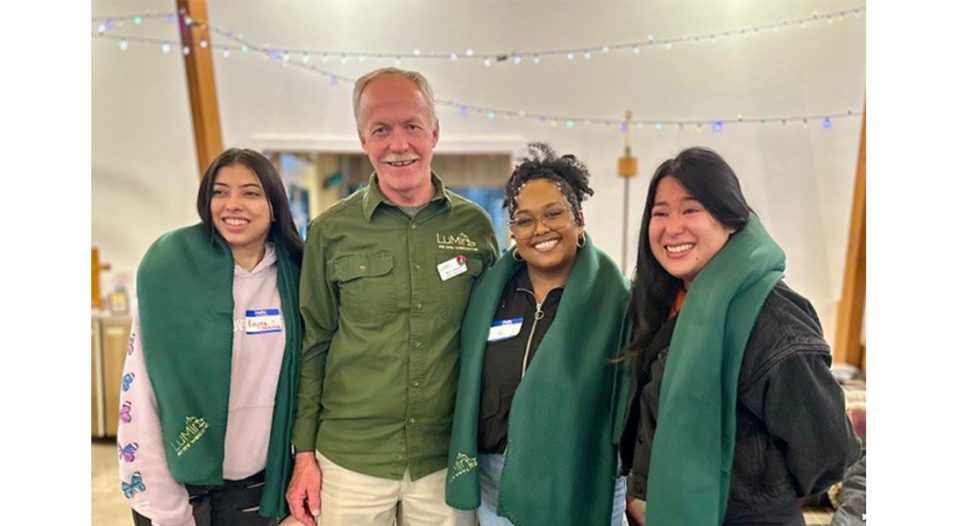Editor’s note: Part one of this story focused on Prince of Peace Lutheran Church in Roseville, Minn., which hosts a tiny-home community on its property.
Like Prince of Peace, a Lutheran-led initiative in Colorado offers an innovative approach to providing housing and creating community. At Colorado State University (CSU), students are now able to obtain affordable housing through a partnership between Lutheran Campus Ministry (LuMin) and a local apartment complex.
Of all our basic human needs, “housing is the most critical … and also the hardest problem to solve,” said Emily Tveite, program director for ELCA Campus Ministry at CSU and, before that, campus pastor at the University of Wisconsin–Madison.
“Homelessness among college students looks different,” she said. “They’re doubling up and couch surfing, or they were at home with their parents but for some reason can’t be anymore. There’s a lot of informal housing, transient housing.”
Colorado State is a 30,000-student land-grant institution in Fort Collins, a city of 170,000 that is located about 60 miles north of Denver. Paul Judson, LuMin pastor at the university, cites a study by Temple University suggesting that at least 2% of Colorado State students are homeless and as many as 4%, or 1,200 people, are housing-insecure.
“Housing costs have gone up so much overall, and at university campuses there’s such a limited supply,” Tveite said. “With housing for students, there’s a huge issue with housing that’s affordable. The housing that is being built is by big developers, luxury housing. So there’s this disparity—places with rooftop pools, intense amenities, while other students are living doubled up in poor conditions.
“It’s tricky because people think college students are supposed to be ‘roughing it.’ There are these stereotypes of living in not the best conditions—‘Oh, it’s normal.’ But for students having these issues, there’s a stigma, and they don’t feel like this is normal. Having to eat macaroni and cheese before payday is normal; systemically not having access to healthy food is something different.”
A valuable network
The seeds of Colorado State’s LuMin Student Housing Security Initiative were planted as Judson, handling the usual campus ministry duties of tending to students’ spiritual and mental wellness, learned about issues they were facing related to nutrition, housing and other basic needs.
First LuMin provided access to washers and dryers and to storage space for the possessions of students who were bouncing from place to place. Then, three years ago, the initiative was born.
LuMin identified an apartment complex that was willing to discount some $1,100-per-month units by $100. Backed by funding from a range of Lutheran, Episcopal, Presbyterian and United Church of Christ groups and individuals, the initiative provides a $250 monthly subsidy for each apartment. This allows 20 students to live two-to-a-unit for an out-of-pocket cost of $375 apiece. The apartments are fully furnished, and all utilities are included.
“We don’t have a way of at looking at people’s financial situation at the university, so what parameters do we set for applications?” Judson said. “We just held on to the idea of no generational wealth, no parents supporting you.”
In the first year the initiative housed 10 residents. The next year that number was 16, and this year it’s up to 20—which is where it will stay, because 10 units is the maximum the complex can offer at the reduced rate.
“Our goal is to help them graduate in a reasonable amount of time and with reasonable debt.”
Once students obtain housing through the Initiative, they can stay there until they earn their degree. In all, 35 students have received housing through LuMin; three of them started in the initiative’s first year and are now about to graduate.
In addition to housing, participants are invited to the campus ministry building twice a week for dinner and programs on financial stability. The residents serve as peer support to one another, Judson said.
“Someone knows how to get food stamps or to get this service with the university and shares that,” he said. “The networking is really valuable. They’re a hidden community, and they don’t want their classmates to know they can’t go skiing on weekends, can’t [go out] Friday because they don’t have money, or they have to work. To be together is valuable.”
The initiative also includes an advocacy piece, Judson said.
“We help 20 students, but there are 600 out there,” he said. “Through great odds, they’ve been able to get through the door and get accepted to the university. But for them it will take six years to graduate because they have to work or go home and help their family, or they drop out. Our goal is to help them graduate in a reasonable amount of time and with reasonable debt.”





